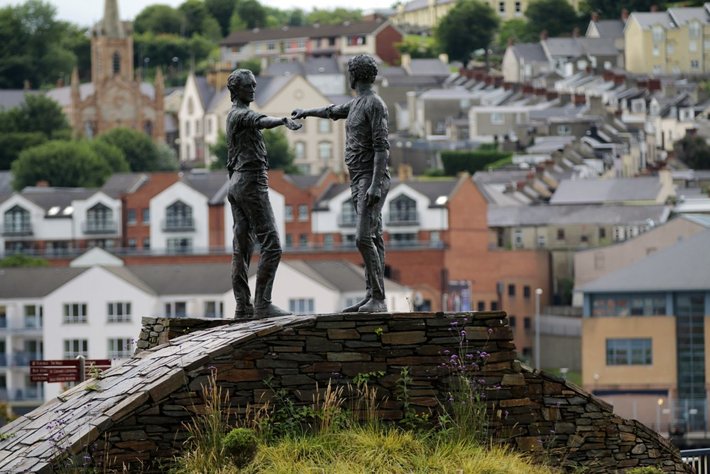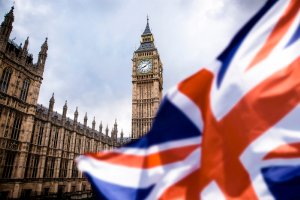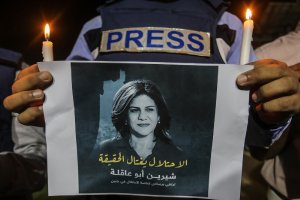Religious leaders in Northern Ireland as well as the Republic of Ireland have urged politicians in Britain and the European Union to find solutions to the recent outbreaks of street violence between Irish Unionists and Nationalists.

Religion has long been viewed as one of the central factors in The Troubles, as summarized by The Britannica, which describes the era as “violent sectarian conflict from about 1968 to 1998 in Northern Ireland between the overwhelmingly Protestant unionists (loyalists), who desired the province to remain part of the United Kingdom, and the overwhelmingly Roman Catholic nationalists (republicans), who wanted Northern Ireland to become part of the Republic of Ireland.” Hence the significance of the interfaith response to recent increased tensions.
“Blessed are the peacemakers, for they shall be called the children of God,” religious leaders wrote to British and EU politicians, adding that “even-handed policing requires the wisdom of Solomon combined with the patience of Job,” according to an April 13 article in Premier Christian News.
Those signing the letter included leaders of the Catholic, Presbyterian and Methodist Churches and the Church of Ireland.
“As Christian Church Leaders from across the island of Ireland, we appeal to our political leaders to come together in a unified response to the heartbreaking scenes witnessed on our streets last week and renew their commitment to peace, reconciliation and the protection of the most vulnerable.”
The violence is likely rooted in a range of issues, including the flow of trade resulting from the Northern Ireland Protocol in the Brexit agreement, lockdown fatigue, a crackdown on drugs, and a failure to take action against people who violated pandemic-related restrictions at the funeral last June of Bobby Storey, a senior Nationalist leader in the Irish Republican Army.
While acknowledging that there are complex reasons behind the hostilities, the church leaders were at pains to point out that church representatives and community leaders working on the grassroots level “have spoken to us of their frustration at seeing another generation of young people risk their lives and their futures because repeated warnings about the need to treat our fragile peace with care went unheeded.”
The considerable reduction in violence since 1998 is a major achievement, the clergy said, referring to the peaceful resolution of the 30-year Northern Ireland conflict.
Some 3,600 people were killed and more than 30,000 wounded in the “The Troubles,” as the Northern Ireland conflict was known. “[T]hat experience also teaches us that these challenges can only be addressed by political leaders coming together with a genuine desire to find solutions and accommodations which meet the legitimate concerns of others as well as their own,” the church leaders wrote in their letter.
They acknowledged the knotty problem of Brexit, which resulted in Britain’s divorce from the EU on December 30, 2020, prompting a new relationship governed by a set of rules that includes the so-called Northern Ireland Protocol. Aimed at protecting the integrity of the EU’s single market for goods, the protocol calls for no new checks on commodities crossing the border between Northern Ireland, which is part of Britain, and the Republic of Ireland.
As such, the protocol “presents many challenges to the flow of trade and also the flow of goodwill across and between these islands,” the clergy wrote in their letter. “Some of the challenges were foreseeable and have been planned for and mitigated (at least in part). The political outcomes of the Protocol are more difficult to address because they are tied in with very big issues of world trade and sovereignty.”
Success is possible only if the Northern Ireland government, known as the Executive, jointly approaches both the EU, including the Republic of Ireland, and advocates for protecting “the common good across the whole Northern Ireland,” wrote the clergy. “Such a joint approach would be difficult to turn down, but to develop it will require a renewed generosity of spirit from political leaders on all sides of our community.”
Noting their responsibility to speak truth to power, the church leaders emphasized how important it is for political leaders to intervene meaningfully by taking preventative rather than emergency measures to forestall crises.
“Churches, together with other civic leaders, are keen to play our part in addressing the root cause of violence and working to ensure all communities here can enjoy the benefits of peace into the future,” the religious leaders said.
_____________
The Church of Scientology publishes this blog to help create a better understanding of the freedom of religion and belief and provide news on religious freedom and issues affecting this freedom around the world.
The Founder of the Scientology religion is L. Ron Hubbard and Mr. David Miscavige is the religion’s ecclesiastical leader.
For more information, visit the Scientology website or the Scientology TV network.


